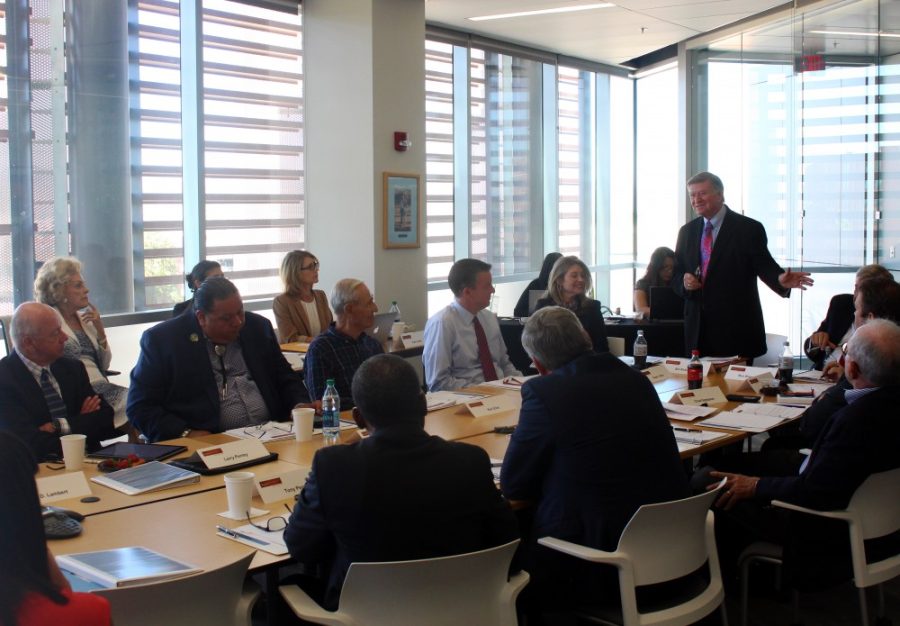The UA Presidential Search Advisory Committee met for the first time on Thursday, Oct. 13 to begin the process of identifying the UA’s next president.
Current UA President, Ann Weaver Hart, announced her decision to not extend her contract via an employee-wide email and an Arizona Board of Regents press release on June 10.
Hart will return as a faculty member in the College of Education after a year-long sabbatical beginning immediately following her official departure from the Office of the President. Regardless of if a replacement is found before her contract terminates in July 2018, Hart will receive her usual salary of $475,000 until her contract runs out.
The committee will begin by identifying 20-30 potential candidates within the next 2-3 months and then carve that list down to eight or 10 before meeting with potential candidates with a final selection of 2-4 from which a candidate will be selected by the board.
The committee said they will search for leadership, experience and communication qualities in the presidential candidates.
Much of the conversation revolved around the necessity for a confidential search.
Committee co-chairs, regents Bill Ridenour and Ron Shoopman, opened up the discussion with the crucial note of confidentiality.
Potential candidates who are publicly identified prior to official notification may turn away from the position, putting the search at risk, according to the committee.
“The need for us to maintain confidentiality of the prospects as we work cannot be overstated, because it puts at risk the search itself,” Shoopman said. “If the people that we are going to be talking to feel that their interest in the university could be compromised, that list will dwindle substantially and immediately.”
The regents hired R. William Funk & Associates, an executive search firm founded by its president, William Funk, to assist with the presidential search.
The firm has helped recruit presidents at about 50 higher-education institutions around the country, including two-thirds of public and half of all institutions in the Association of American Universities, of which UA has been a member since 1985.
RELATED: Hart: ‘Sometimes it’s time to move on‘
There are nearly 50 vacancies at institutions with more than 5,000 students around the country today, including University of California, Berkeley and Davis, Auburn University, Duke University and Cornell University, according to Funk. Funk likes the committee’s chances but expects to compete with some of these universities in the search.
Funk also echoed the necessity for confidentiality.
“The quickest way to lose a potentially good candidate is for that person to be prematurely revealed as a candidate,” Funk said. “The better the candidate, the more sensitivity there is to being revealed too early in this process. Those individuals will have more to lose.”
The committee is composed of 27 education and industry leaders including university officials Greg Byrne, vice president and director of athletics, Marc Miller, dean of the Rogers College of Law, Melinda Burke, president of the UA Alumni Association and Kendal Washington White, assistant vice president and dean of students.
RELATED: Editorial: Issues of transparency at Hart
The committee also includes the influences of several current and former CEOs, presidents and chairmen like Karl Eller, alumnus, chairman and CEO of the Eller Company, Eileen Klein, president of the regents and Lee Lambert, chancellor of Pima Community College.
“This is the most important search you will encounter in the next decade, for Tucson, Southern Arizona or any other state,” Shoopman said. “The reason you’re all here is because of the qualities that you bring.”
The committee agreed that candidates must have an affinity for the UA and be able to articulate the university’s institutional, cultural and regional history and be skilled in business relations in order to develop strategies and structures to increase the university’s resources.
RELATED: Regents talk state funding, Hart’s transition terms
“The model of getting state funds is gone,” said Jeff Stevens, CEO of Western Refinery Inc. “You’re not going to be able to count on getting the level of funding you got in the past. When I look at the next leader [I ask], ‘Is this someone that can walk into a CEO’s office and represent the university to the point where they’re almost a fundraiser?’”
The discussion also focused on a candidates’ need for familiarity with investment in research as the UA is lauded as a premiere research institution.
The committee is not only looking for someone with the leadership and management skills to govern the university, but someone who is skilled in outreach and recruitment, as well as coordinating different groups within and outside the university
“We will never settle for a leader that isn’t top-notch for this university,” Shoopman said.
Follow Nick Meyers on Twitter.









